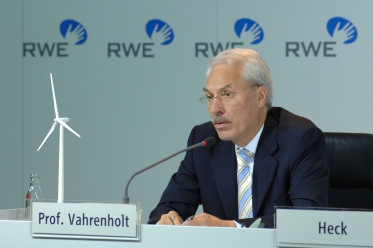Germany's 'Energiewende' Not Sustainable: Sceptic
Germany's decarbonising energy transformation, or 'Energiewende,' cannot last indefinitely, according to leading German climate change sceptic and former politician and industrialist Fritz Vahrenholt (pictured below). Eventually there will come a point when the rural population, or wildlife protection agencies, or a weakening economy or failures in the grid itself will force a return to conventional generation, he said.
Addressing a roomful of the converted in the House of Commons late January 17 by invitation of the Global Warming Policy Foundation, he said that Chancellor Angela Merkel had fired from the hip with her 2011 decision to accelerate the closure of nuclear plants which provided 30% of German power demand, and the aim to replace them with renewable generation. Many of the reactors are in southern Germany.
Most of Germany's wind is in the north and there is not yet capacity to deliver it southwards. Nevertheless the policy, at a cost of €25bn/yr, has worked so far. "The majority of the population supports it," he said. This is despite an additional €280/yearly bill – and household prices are still lower than in Denmark. That would increase though in the short term if a subsoil cable is laid north-south to transfer power to where it is needed.

Fritz Vahrenholt when appointed head of RWE's new renewables firm Innogy in 2007 (Photo credit: RWE)
"Economically, these are good times. The euro is weak and industry is prospering from the initiatives of [the then chancellor, Gerhard] Schroder from a decade ago," he said. Industry is happy as the oversupply of electricity helps it remain competitive. And when supplies fail, it can import from its neighbours. However building more wind farms, the current strategy, is not the only answer, as the wind cannot be predicted and their output fluctuates enormously. "Nil multiplied by x is still nil," he said, while the price keeps mounting, and the carbon price remains too low to encourage carbon capture and storage at lignite plants which remain essential to fill the intermittency gaps, as gas-fired plant is mothballed or closed completely.
Low power prices, meanwhile, discourage investment in new baseload capacity, while heavy use of lignite plants - the cheapest to build and operate -- has contributed to Germany's rising carbon emissions.
Planting biofuels has hit the food chain in the countryside; the resultant pesticide use and monoculture has led to major declines in bird of prey numbers.
Germany could have achieved ten times as much carbon abatement for the same money if it had spent it anywhere else in the world, he said, but politicians were too scared to admit the policy was misguided and so they would keep on with it until an economic crisis forced their hand.
In 2001, Vahrenholt founded the wind energy company REpower and in 2007 became head of RWE’s renewable energy division Innogy, one of Europe’s largest renewable energy companies. His 2012 book The Neglected Sun sparked a broad public discussion in Germany about the dogmatism in climate science. He is the chairman of the German Wildlife Foundation and a member of the GWPF's Academic Advisory Council.
It's been announced that Germany's national election will be held on September 24.
William Powell



